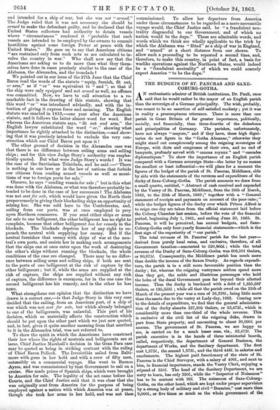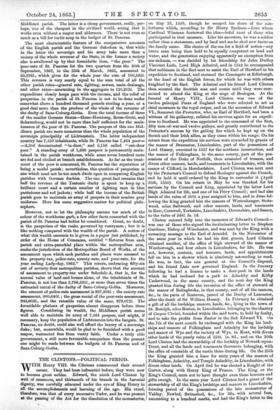THE BUDGETS OF ST. PANCRAS AND SAXE- COBITRG-GOTHA.
A N enthusiastic admirer of British institutions, Dr. Pauli, once A said that he would rather be the mayor of an English parish than the sovereign of a German principality. The wish, probably, was meant to be an assertion of self-satisfied modesty ; yet it was in reality a presumptuous utterance. There is more than one parish in Great Britain of far greater importance, politically, socially, and financially, than three-fourths of the dukedoms and principalities of Germany. The parishes, unfortunately, have not always "mayors," and if they have, these high digni- taries do not figure in the " Gotha Almanac," otherwise they might stand out conspicuously among the reigning sovereigns of Europe, with diets and congresses of their own, and no end of banquets, profusely served with " canons royaux " and " cascades diplematiques." To show the importance of an English parish compared with a German sovereign State—the latter by no means the smallest or least influential—we will place for a moment the figures of the budget of the parish of St. Pancras, Middlesex, side by side with the statements of the revenue and expenditure of the duchy of Saxe-Coburg-Gotha. The parish accounts we draw from a small quarto, entitled, " Abstract of cash received and expended by the Vestry of St. Pancras, Middlesex, from the 26th of March, 1862, to the- 25th of March, 1863 ;" together with a " General statement of receipts and payments on account of the poor-rate ; " while the budget figures of the duchy over which Prince Alfred is to reign one day are taken from the official statement laid before the Coburg Chamber last session, before the vote of the financial period, beginning July 1, 1861, and ending June 30, 1863. St. Pancras, it will be perceived, has annual budgets, and Sane- Coburg-Gotha only four-yearly financial statements—which is the first sign of the superiority of " our parish." The total revenue of St. Pancras' parish for the last year derived from purely local rates, and exclusive, therefore, of all Government taxation—amounted to 220,8051.; while the total revenue of the Duchy of Saxe-Coburg-Gotha. was 606,501 thalers, or 90,975/. Consequently, the Middlesex parish has much more than double the income of the Saxon Duchy. As• regards expendi- ture, the parish is in a still more favourable position than the duchy ; for, whereas the reigning vestrymen seldom spend more than they get, the noble and illustrious personages who hold the helm of the ducal Government pass far beyond their allotted income. Thus the duchy is burdened with a debt of 1,235,687 thalers, or 185,353/. ; while all that the parish owed on the 25th of March of the present year was a sum of 36,3281., being little more than the assets due to the vestry at Lady-day, 1863. Coming now to the details of expenditure, we find that the general administra- tion of the duchy absorbs 227,305 thalers, or 32,472/., which is considerably more than one-third of the whole revenue. This is exclusive of the civil list of the reigning duke, drawn in part from State property, and amounting to about 20,0001. per annum. The government of St. Pancras, we are happy to see, is carried on for a much lesser sum, viz., 52,4721. The parish executive is in the hands of three ministerial boards, called, respectively, the department of General Business, the department of Works, and the Sanitary department. The first cost 1,375/., the second 1,3721., and the third 448/. in salaries and emoluments. The highest paid functionary of the state of St. Pancras is the Chief Surveyor, with a salary of 4001., and next to him, in financial importance, stands the Vestry Clerk, enjoying a stipend of 3501. The head of the Sanitary Department, we are sorry to learn, has only 2501., while the "Inspector of Nuisances" has to be content with 991. The nuisances of Saxe-Coburg- Gotha, on the other hand, which are kept under proper supervision by a strong body of military and civil " Beamten," cost more than 9,000/., or five times as much as the whole government of the
Middlesex parish. The latter is a cheap government, really, per- haps, one of the cheapest in the civilized world, seeing that it works even without a mayor and aldermen. There is not even so much as a bill for turtle soup in the budget of St. Pancras.
The most characteristic feature of the comparative accounts of the English parish and the German dukedom is, that while in the latter the sovereign and his army take more than a moiety of the whole revenue of the State, in the former a moiety also is swallowed up by that formidable item, "the poor." The poor-rate of St. Pancras for the two quarters from the 30th of September, 1862, to the 25th of March, 1863, amounted to 55,2961., which gives for the whole year the sum of 100,5921. This revenue is very nearly equal to the sum total of all the other parish rates—general rate, lighting, sewers, main-drainage, and other rates—amounting in the aggregate to 120,2131. The expenditure closely keeps pace with the income, and the relief of pauperism in the parish of St. Pancras is not to be done under somewhat above a hundred thousand pounds sterling a year, or a good deal more than the produce of the whole of the revenue of the duchy of Saxe-Coburg-Gotha. Even the total income of three of the smaller German States—Ilene-Homburg, Reuss-Greiz, and Schaumburg, would not be more than half sufficient for the main- tenance of the poor of St. Pancras. The paupers of this one Mid- dlesex parish are more numerous than the whole population of the sovereign principality of Lichtenstein. The latter independent country has 7,150 inhabitants, while St. Pancras has 7,464 poor- -2,306 denominated "in-door," and 5,158 called "out-door poor." A standing army of 1,688 paupers is permanently main- tained in the parish workhouse, while some seven hundred more are fed and clothed at branch establishments. As far as the treat- ment of the poor is concerned, St. Pancras has the reputation of being a model parish ; nevertheless, this question of pauperism is one which need not be too much dwelt upon in comparing English parishes with German duchies. The one great fact remains that half the revenue of the Teutonic duchy is spent to keep up a brilliant court and a certain number of fighting men in blue pantaloons and red jackets ; while half the income of the British parish goes to maintain an army of paupers in their sombre grey uniforms. Here lies some suggestive matter for political philo- sophers.
However, not to let the philosophy assume too much of the colour of the workhouse garb, a few other facts connected with the parish of St. Pancras had better be considered. Great, no doubt, is the pauperism of the realm governed by vestrymen ; but it is like nothing compared with the wealth of the parish. A notion of what this wealth amounts to is given in a paper just published, by order of the House of Commons, entitled " Returns from each parish and extra-parochial place within the metropolitan area, under the jurisdiction of the Metropolitan Board of Works, of the assessment upon which such parishes and places were assessed to the property-tax, police-rate, county-rate, and poor-rate, for the year ending Lady-day, 1862." This return, embracing fifty-six out of seventy-four metropolitan parishes, shows that the amount of assessment to property-tax under Schedule A, that is, for the annual value of land and houses alone, of the inhabitants of St. Pancras, is not less than 3,798,521/, or more than seven times the estimated rental of the duchy of Saxe-Coburg-Gotha. Moreover, the amount of police-rate assessment is 827,203/. ; the county-rate assessment, 800,640/. ; the gross rental of the poor-rate assessment, 945,0021., and the rateable value of the same, 879,0721. The formidable phalanx of pauperism almost disappears before these figures. Considering its wealth, the Middlesex parish seems well able to maintain its army of 7,464 paupers, and might, if necessary, keep the population of Lichtenstein into the bargain. St. Pancras, no doubt, could also well afford the luxury of a sovereign duke ; but, meanwhile, would be glad to be furnished with a good mayor, warranted free from vestry faith. Under a truly able government, a still more favourable comparison than the present one might be made between the budgets of St. Pancras and of Saxe-Coburg-Gotha.































 Previous page
Previous page